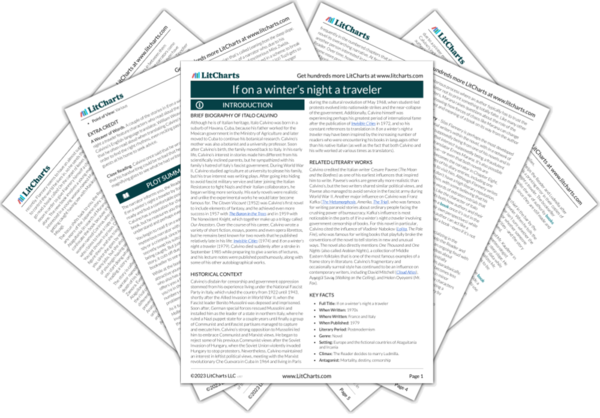Italo Calvino had firsthand experience with government oppression, living through the reign of the fascist government of Benito Mussolini in Italy, and later opposing the harsh rule of Joseph Stalin and his immediate successors in the Soviet Union. This likely explains why the various story fragments within If on a winter’s night a traveler often contain elements of paranoia, evoking fears of surveillance and punishment, with some making direct reference to totalitarian governments. The most straightforward instance of government oppression comes in the final few chapters, when you (the Reader) are imprisoned in Ataguitania, a country that bans books, only to be sent later on secret mission to Ircania, a country with a totally different political situation that ends up banning different books for a different reason.
Although characters like Corinna and Arkadian Porphyrich try to emphasize how humane their prisons are and why the policy of book banning makes sense, the Reader can see the absurdity of his situation and how hypocritical those characters are. Arkadian Porphyrich considers himself part of a movement, which he calls “the Spirit,” that crosses national and ideological boundaries. But his seemingly hopeful declaration of unity has sinister undertones, suggesting that in many diverse nations and ideologies there is the danger of people who blindly submit to authority, enacting censorship and oppression without understanding why. Throughout the novel, Calvino depicts other menacing characters who also seem to have “the Spirit” of oppression, like the men from Section D in What story down there awaits its end? who are capable of making parts of the world disappear at will or the narrator of In a network of lines that intersect, who is so obsessed with safety that he ends up trapping himself. And so, in If on a winter’s night a traveler, Italo Calvino celebrates the power of reading by showing how determined some people are to control books through censorship. In so doing, Calvino also satirizes oppressive regimes by showing how they can use benign language to hide cruelty and hypocrisy.
Censorship and Government Oppression ThemeTracker

Censorship and Government Oppression Quotes in If on a winter’s night a traveler
I sensed at once that in the perfect order of the universe a breach had opened, an irreparable rent.
“The real revolution will be when women carry arms.”
“I don’t understand who you’re accusing, I don’t know anything about your stories. I follow a very clear strategy. The counterpower must infiltrate the mechanisms of power in order to overthrow it.”
“And then reproduce it, identically! It’s no use your camouflaging yourself, Lotaria! If you unbutton one uniform, there’s always another uniform underneath!”
“I don’t know if you believe in the Spirit, sir. I believe in it. I believe in the dialogue that the Spirit conducts uninterruptedly with itself. And I feel that this dialogue is fulfilled as my gaze examines these forbidden pages. The Police is also Spirit, the State that I serve, the Censorship, like the texts on which our authority is exercised. The breath of the Spirit does not require a great audience to reveal itself; it flourishes in the shadow, in the obscure relationship perpetuated between the secrecy of the conspirators and the secrecy of the Police.”
On the ground that separates me from Franziska I see some fissures open, some furrows, crevasses; at each moment one of my feet is about to be caught in a pitfall: these interstices widen, soon a chasm will yawn between me and Franziska, an abyss!











